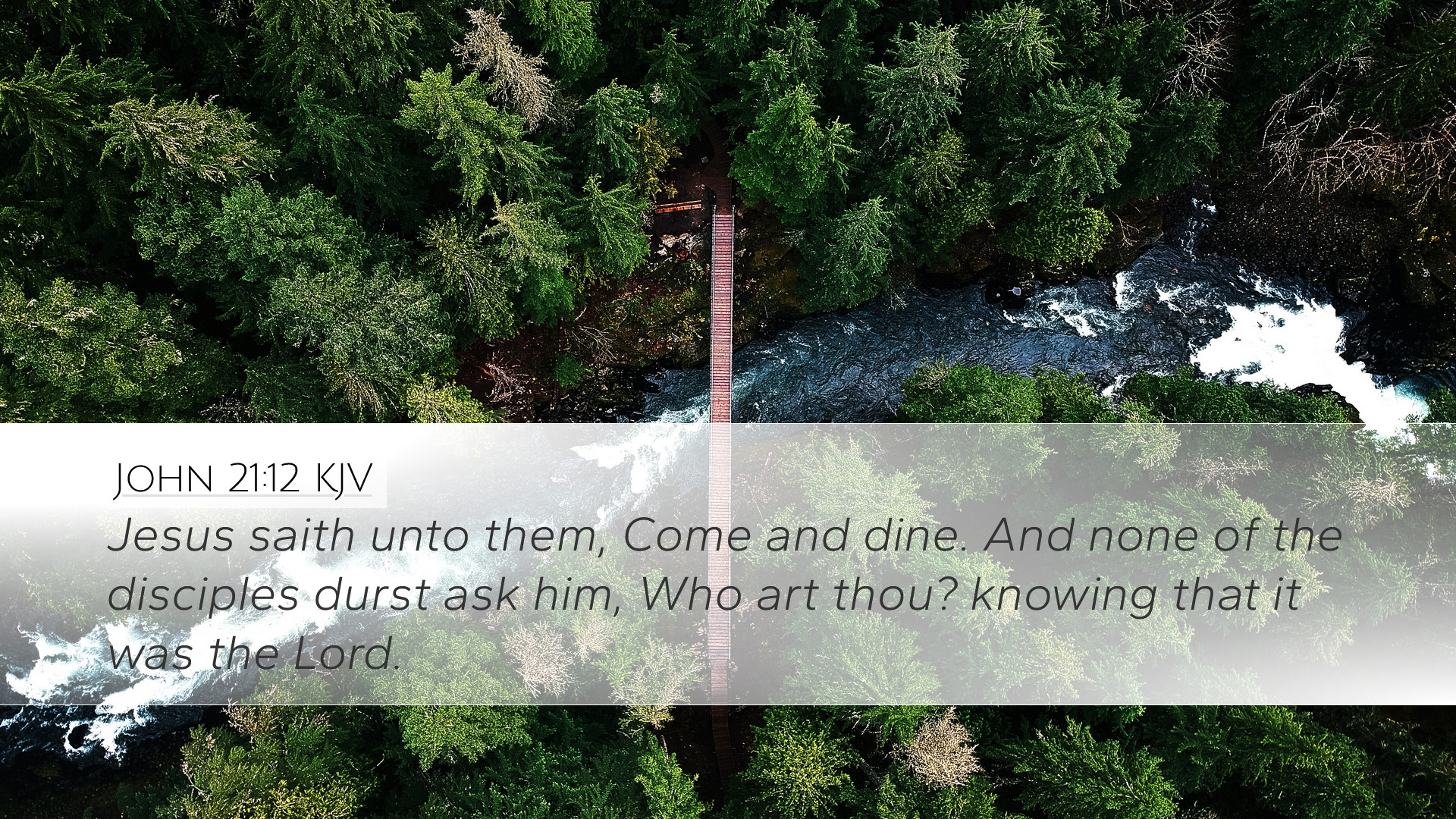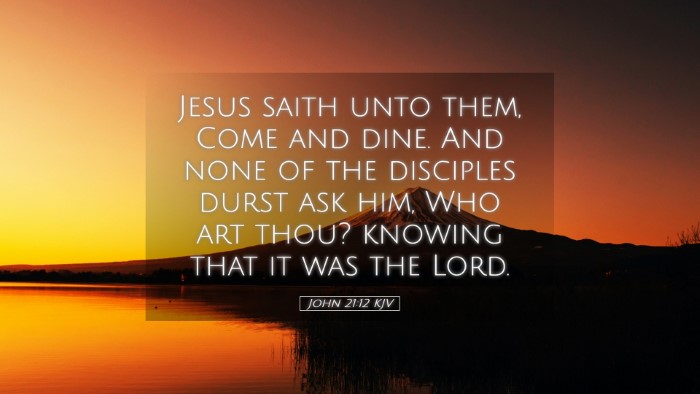Old Testament
Genesis Exodus Leviticus Numbers Deuteronomy Joshua Judges Ruth 1 Samuel 2 Samuel 1 Kings 2 Kings 1 Chronicles 2 Chronicles Ezra Nehemiah Esther Job Psalms Proverbs Ecclesiastes Song of Solomon Isaiah Jeremiah Lamentations Ezekiel Daniel Hosea Joel Amos Obadiah Jonah Micah Nahum Habakkuk Zephaniah Haggai Zechariah MalachiJohn 21:12
John 21:12 KJV
Jesus saith unto them, Come and dine. And none of the disciples durst ask him, Who art thou? knowing that it was the Lord.
John 21:12 Bible Commentary
Commentary on John 21:12
John 21:12 states: "Jesus said to them, 'Come and have breakfast.' None of the disciples dared ask him, 'Who are you?' They knew it was the Lord." This verse highlights an intimate moment between Christ and His disciples after His resurrection, surrounding the themes of recognition, fellowship, and divine purpose. This commentary synthesizes insights from several public domain sources, providing a comprehensive examination of this profound scripture.
Context and Significance
This passage occurs during one of the post-resurrection appearances of Jesus, specifically by the Sea of Tiberias. The events leading up to this moment are rich with emotion as they encapsulate the disciples’ transition from despair after the crucifixion to joy at the resurrection. The gathering of the disciples around breakfast with the risen Christ serves as an important demonstration of Jesus’ continued presence and care for His followers.
Insights from Matthew Henry
Matthew Henry emphasizes the importance of fellowship in this passage. He notes that after a long, fruitless night of fishing, the disciples were called by Jesus to break bread with Him. This illustrates the profound reality that spiritual sustenance is found in communion with Christ. Henry observes the gentle invitation from Jesus—“Come and have breakfast”—as indicative of His nurturing nature. It reflects the relational aspect of the Christian faith; that believers are not simply followers, but invited into personal and intimate fellowship with their Savior.
Recognizing the Lord
Henry points out that despite their initial uncertainty, the disciples knew it was the Lord. He writes about the combination of their acknowledgment and hesitance—it reveals a natural human response to the divine. This remark is significant in theological discourse, emphasizing the necessity of faith in recognizing Christ's works and His presence in our lives. The reluctance to question Him further suggests a deep reverence and understanding of who Jesus is post-resurrection.
Insights from Adam Clarke
Adam Clarke offers an in-depth look at the invitation to breakfast. He states that this act was not merely a casual gathering, but served multiple purposes: it was a time of renewal for the disciples who had been disheartened by recent events. Clarke elaborates that breakfast symbolizes divine provision, akin to the manna provided to the Israelites in the wilderness. Thus, it can be seen as a reminder that God continues to sustain His people even in their lowest moments.
Symbolism and Application
In this context, Clarke identifies the breakfast as a metaphorical representation of the Eucharist—the body and blood of Christ given for believers. This correlation invites deeper theological reflections on communion, the remembrance of Christ’s sacrifice, and the continual nourishment He provides through His word and presence. Consequently, believers are called to reflect on their own spiritual meals and the importance of regular fellowship with Christ and one another.
Insights from Albert Barnes
Albert Barnes comments on the humility of the disciples in their interaction with Jesus. He notes that the disciples’ hesitance to inquire further about His identity demonstrates their awe and recognition of Him as their Lord. Barnes elaborates that this situation signifies a shift in their understanding of Jesus post-resurrection; they no longer simply saw Him as a teacher, but fully recognized His divinity, confirming their faith in His resurrection.
Trust and Identity
Barnes emphasizes the importance of trust in Christ’s identity. He suggests that in moments of uncertainty, believers must lean into their faith and previous experiences with Christ to guide them. This insight is particularly beneficial for theologians and pastors, as it underscores the necessity of confidence in Christ amidst doubts or struggles in their ministries or personal lives.
The Nature of Jesus’ Invitation
The invitation from Jesus to “Come and have breakfast” serves as a powerful reminder of His desire for relationship with His followers. Each commentator notes the warmth and accessibility of Christ encapsulated in this simple invitation. It reflects God's approach to human beings—intimate, personal, and inviting. This contrasts with the extraordinary nature of His resurrection, which underscores that the transcendent God desires to meet His people in their everyday lives.
Conclusion and Reflection
In conclusion, John 21:12 encapsulates a wealth of theological and practical insights. The interplay of recognition, relationship, and divine provision found in this passage is essential for every believer. For pastors, students, and theologians, this scripture reaffirms the critical nature of fellowship with Christ and the importance of communion within the body of believers.
As we reflect on this passage, let us consider how we respond to Jesus’ invitation in our own lives. Are we taking the time to acknowledge Him in our daily activities? Are we feeding on the spiritual nourishment He offers? Let this scripture challenge us to deepen our faith, engage in fellowship with our Lord, and recognize His presence in our lives.


